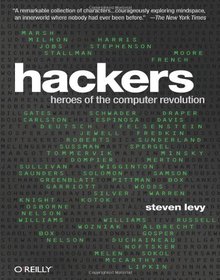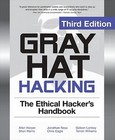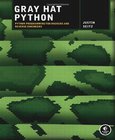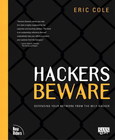Hackers
Heroes of the Computer Revolution - 25th Anniversary Edition

Book Details:
| Publisher: | O'Reilly Media |
| Series: | OReilly |
| Author: | Steven Levy |
| Edition: | 1 |
| ISBN-10: | 1449388396 |
| ISBN-13: | 9781449388393 |
| Pages: | 520 |
| Published: | May 27 2010 |
| Posted: | Nov 19 2014 |
| Language: | English |
| Book format: | |
| Book size: | 12.56 MB |
Book Description:
This 25th anniversary edition of Steven Levy's classic book traces the exploits of the computer revolution's original hackers -- those brilliant and eccentric nerds from the late 1950s through the early '80s who took risks, bent the rules, and pushed the world in a radical new direction. With updated material from noteworthy hackers such as Bill Gates, Mark Zukerberg, Richard Stallman, and Steve Wozniak, Hackers is a fascinating story that begins in early computer research labs and leads to the first home computers. Levy profiles the imaginative brainiacs who found clever and unorthodox solutions to computer engineering problems. They had a shared sense of values, known as "the hacker ethic," that still thrives today. Hackers captures a seminal period in recent history when underground activities blazed a trail for today's digital world, from MIT students finagling access to clunky computer-card machines to the DIY culture that spawned the Altair and the Apple II. Amazon.com Exclusive: The Rant Heard Round the World By Steven Levy Author Steven Levy When I began researching Hackers--so many years ago that its scary--I thought Id largely be chronicling the foibles of a sociologically weird cohort who escaped normal human interaction by retreating to the sterile confines of computers labs. Instead, I discovered a fascinating, funny cohort who wound up transforming human interaction, spreading a culture that affects our views about everything from politics to entertainment to business. The stories of those amazing people and what they did is the backbone of Hackers: Heroes of the Computer Revolution. But when I revisited the book recently to prepare the 25th Anniversary Edition of my first book, it was clear that I had luckily stumbled on the origin of a computer (and Internet) related controversy that still permeates the digital discussion. Throughout the book I write about something I called The Hacker Ethic, my interpretation of several principles implicitly shared by true hackers, no matter whether they were among the early pioneers from MITs Tech Model Railroad Club (the Mesopotamia of hacker culture), the hardware hackers of Silicon Valleys Homebrew Computer Club (who invented the PC industry), or the slick kid programmers of commercial game software. One of those principles was Information Should Be Free. This wasnt a justification of stealing, but an expression of the yearning to know more so one could hack more. The programs that early MIT hackers wrote for big computers were stored on paper tapes. The hackers would keep the tapes in a drawer by the computer so anyone could run the program, change it, and then cut a new tape for the next person to improve. The idea of ownership was alien. This idea came under stress with the advent of personal computers. The Homebrew Club was made of fanatic engineers, along with a few social activists who were thrilled at the democratic possibilities of PCs. The first home computer they could get their hands on was 1975s Altair, which came in a kit that required a fairly hairy assembly process. (Its inventor was Ed Roberts, an underappreciated pioneer who died earlier this year.) No software came with it. So it was a big deal when 19-year-old Harvard undergrad Bill Gates and his partner Paul Allen wrote a BASIC computer language for it. The Homebrew people were delighted with Altair BASIC, but unhappy that Gates and Allen charged real money for it. Some Homebrew people felt that their need for it outweighed their ability to pay. And after one of them got hold of a borrowed tape with the program, he showed up at a meeting with a box of copies (because it is so easy to make perfect copies in the digital age), and proceeded to distribute them to anyone who wanted one, gratis. This didnt sit well with Bill Gates, who wrote what was to become a famous Letter to Hobbyists, basically accusing them of stealing his property. It was the computer-age equivalent to Luther posting the Ninety-Five Theses on the Castle Church. Gates complaints would reverberate well into the Internet age, and variations on the controversy persist. Years later, when another undergrad named Shawn Fanning wrote a program called Napster that kicked off massive piracy of song files over the Internet, we saw a bloodier replay of the flap. Today, issues of cost, copying and control still rage--note Viacoms continuing lawsuit against YouTube and Google. And in my own businessjournalism--availability of free news is threatening more traditional, expensive new-gathering. Related issues that also spring from controversies in Hackers are debates over the walled gardens of Facebook and Apples iPad. I ended the original Hackers with a portrait of Richard Stallman, an MIT hacker dedicated to the principle of free software. I recently revisited him while gathering new material for the 25th Anniversary Edition of Hackers, he was more hard core than ever. He even eschewed the Open Source movement for being insufficiently noncommercial. When I spoke to Gates for the update, I asked him about his 1976 letter and the subsequent intellectual property wars. Dont call it war, he said. Thank God we have an incentive system. Striking the right balance of how this should work, you know, there's going to be tons of exploration. Then he applied the controversy to my own situation as a journalism. Things are in a crazy way for music and movies and books, he said. Maybe magazine writers will still get paid 20 years from now. Who knows? Maybe you'll have to cut hair during the day and just write articles at night. So Amazon.com readers, its up to you. Those who have not read Hackers,, have fun and be amazed at the tales of those who changed the world and had a hell of time doing it. Those who have previously read and loved Hackers, replace your beat-up copies, or the ones you loaned out and never got back, with this beautiful 25th Anniversary Edition from OReilly with new material about my subsequent visits with Gates, Stallman, and younger hacker figures like Mark Zuckerberg of Facebook. If you dont I may have to buy a scissors--and the next bad haircut could be yours! Read Bill Gates' letter to hobbyists
Download Link:
Related Books:
Honeypots
Tracking Hackers
Honeypots are highly sophisticated technologies used to observe and learn about hackers. Practical and commercial interest in these new forms of hacker defense is now hitting the mainstream. There are many successful commercial honeypots, including ManTrap and Specter. Security expert Marcus Ranum notes in his Foreword, "Right now there are about a half-dozen commercial honeypot products on the market. Within a year, I predict there will be dozens. Within two years, there will be a hundred." Spitzner also covers legal issues, one of the most controversial subjects concerning honeypots, receiving extensive guidance from the Department of Justice in writing the legal material. The book, Know Your Enemy was written by a team of authors, and fo...
Gray Hat Hacking
The Ethical Hackers Handbook
3rd Edition
THE LATEST STRATEGIES FOR UNCOVERING TODAY'S MOST DEVASTATING ATTACKS Thwart malicious network intrusion by using cutting-edge techniques for finding and fixing security flaws. Fully updated and expanded with nine new chapters, Gray Hat Hacking: The Ethical Hacker's Handbook, Third Edition details the most recent vulnerabilities and remedies along with legal disclosure methods. Learn from the experts how hackers target systems, defeat production schemes, write malicious code, and exploit flaws in Windows and Linux systems. Malware analysis, penetration testing, SCADA, VoIP, and Web security are also covered in this comprehensive resource. Develop and...
Gray Hat Python
Python Programming for Hackers and Reverse Engineers
Python is fast becoming the programming language of choice for hackers, reverse engineers, and software testers because it's easy to write quickly, and it has the low-level support and libraries that make hackers happy. But until now, there has been no real manual on how to use Python for a variety of hacking tasks. You had to dig through forum posts and man pages, endlessly tweaking your own code to get everything working. Not anymore.Gray Hat Python explains the concepts behind hacking tools and techniques like debuggers, trojans, fuzzers, and emulators. But author Justin Seitz goes beyond theory, showing you how to harness existing Python-based security tools - and how to build your own when the pre-built ones won't cut it.You'll learn how to: Aut...
Hackers Beware
The Ultimate Guide to Network Security
Hackers Beware starts with a roadmap of the various areas of hacking but quickly delves into the details of how specific attacks work and how to protect against them. Since most attacks we hear about either occur or are perceived to come from hackers, people are very interested "in how they do that" - the techniques hackers use to break into systems. Hackers Beware is unique in that it gives specific exploits, exactly how they work and how to protect against them. This book will help readers understand what security threats they are up against and what they need to do to protect against them. Some books cover this from a high level but do not get into the details of specific exploits and cover it in a case by case fashion. This book will co...
2007 - 2021 © eBooks-IT.org



